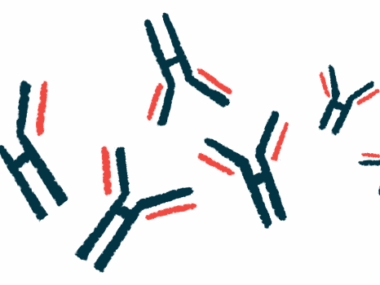Blood Levels of Cytokine May Predict Severity of Lung Disease in Early-stage Systemic Sclerosis Patients
Written by |

High levels of a cytokine called CCL2 circulating in the blood can predict how quickly and severely lung disease will progress in people in the early stages of systemic sclerosis (SSc), a study suggests.
The research “CCL2 in the Circulation Predicts Long-Term Progression of Interstitial Lung Disease in Patients With Early Systemic Sclerosis” was published in the journal Arthritis & Rheumatology.
SSc patients show a varied profile of cytokines (signalling molecules), but how this profile influences the progression of interstitial lung disease (ILD) — the leading cause of death among people with systemic sclerosis — is poorly understood.
For this reason, a research team investigated the predictive value of key cytokines for long-term progression of ILD and survival in two groups of patients with early SSc.
Researchers measured the levels of several cytokines in blood samples from 266 patients with early SSc, who had enrolled in the Genetics versus Environment in Scleroderma Outcome Study (GENISOS) discovery group. GENISOS came from a collaboration between the University of Texas Health Science Center (UTHSC) at Houston, the UTHSC at San Antonio, and the University of Texas Medical Branch at Galveston.
Cytokine levels were also tested in healthy controls.
The study’s primary endpoint was based on the decline of forced vital capacity percent predicted (FVC%; a measure of lung function) value over time.
In total, researchers first measures 11 key cytokines, including interleukin (IL)-1b, IL-5, IL-6, IL-8, IL- 10, IL-12, IL-13, tumor necrosis factor (TNF), CCL2, I-TAC, and IP-10. Results showed that the levels of several of these cytokines were significantly higher in SSc patients relative to controls.
The team then investigated how cytokine values correlated with lung disease.
After adjusting for participants’ age, sex, and ethnicity, the results identified CCL2 and IL-10 as significant predictors of ILD progression in the first group of participants. Specifically, they found that high CCL2 levels in circulation were predictive of faster, long-term decline in FVC%, while higher IL-10 levels predicted a slower decline. High levels of CCL2 were also predictive of poorer survival.
To validate these findings, the team measured the levels of these same cytokines in a second group of early SSc patients from the Canadian Scleroderma Research Group (CSRG). In this cohort, only CCL2 retained its predictive value — high levels of the cytokine were once again predictive of faster decline in FVC% values and poorer survival.
Overall, these results suggest that “higher CCL2 levels in the circulation were predictive of ILD progression and poorer survival in patients with early SSc, findings that support the notion that CCL2 has a role as a biomarker and potential therapeutic target,” the team concluded.





